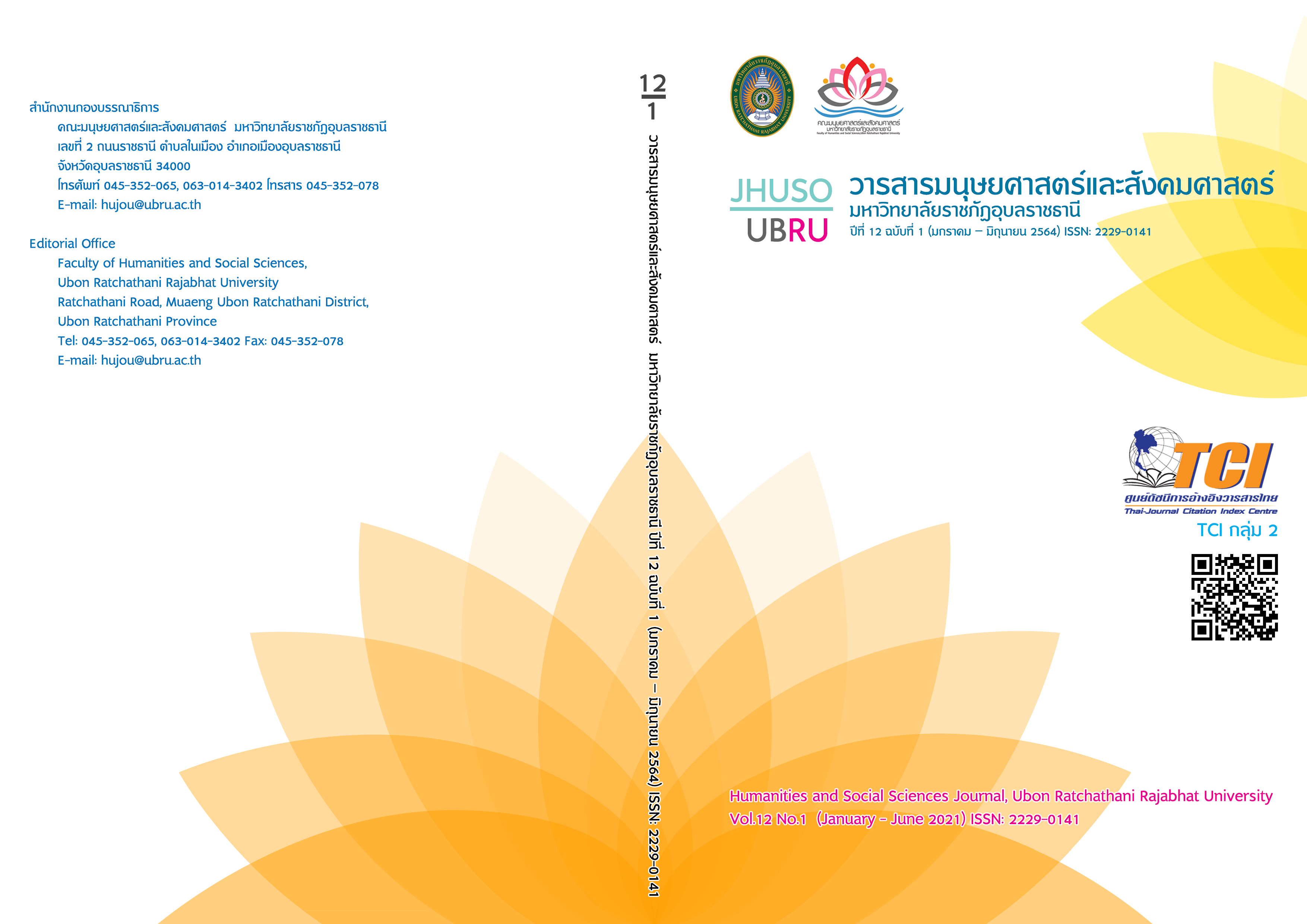ผลของเทคนิคการเขียนเชิงกลยุทธ์ต่อการส่งเสริมทักษะการเขียนของนักเรียนไทยที่เรียนภาษาอังกฤษเป็นภาษาต่างประเทศ
Main Article Content
บทคัดย่อ
การวิจัยนี้มีวัตถุประสงค์เพื่อ 1) ตรวจสอบผลของเทคนิคการเขียนเชิงกลยุทธ์ต่อการส่งเสริมทักษะ
การเขียนเล่าเรื่องของนักเรียนไทยที่เรียนภาษาอังกฤษเป็นภาษาต่างประเทศ และ 2) สำรวจเจตคติของ
นักเรียนที่มีต่อการสอนเทคนิคการเขียนเชิงกลยุทธ์ผู้เข้าร่วมในการวิจัยกึ่งทดลองในครั้งนี้ ประกอบด้วย
นักเรียนไทยที่เรียนภาษาอังกฤษเป็นภาษาต่างประเทศ ระดับชั้นมัธยมศึกษาปีที่ 4 ในภาค
ตะวันออกเฉียงเหนือของประเทศไทย จำนวน 80 คน ผู้เข้าร่วมได้ถูกแบ่งออกเป็น 2 กลุ่ม ได้แก่ นักเรียน
กลุ่มทดลอง จำนวน 40 คน และนักเรียนกลุ่มควบคุม จำนวน 40 คน นักเรียนกลุ่มทดลองถูกสอนโดยใช้
เทคนิคการเขียนเชิงกลยุทธ์โดยผสมผสานระหว่าง 2 กลยุทธ์คือ STOP และ POWER ขณะที่นักเรียนกลุ่ม
ควบคุมถูกสอนโดยใช้วิธีการแบบดั้งเดิม เครื่องมือที่ใช้ในการวิจัย ได้แก่ แบบทดสอบการเขียนก่อนเรียนและ
หลังเรียน แบบสอบถาม และแบบสัมภาษณ์กึ่งโครงสร้าง ผลการศึกษาในครั้งนี้แสดงให้เห็นว่าทักษะการ
เขียนของนักเรียนกลุ่มทดลองโดยการสอนเทคนิคการเขียนเชิงกลยุทธ์ให้ผลดีมากกว่าทักษะการเขียนของ
นักเรียนในกลุ่มควบคุมโดยใช้การสอนแบบเดิม ค่าเฉลี่ยของการทดสอบหลังเรียนของนักเรียนกลุ่มทดลองมี
ค่าเท่ากับ 20.26 และค่าเฉลี่ยของการทดสอบหลังเรียนของกลุ่มควบคุมมีค่าเท่ากับ 12.67 มีความแตกต่าง
ทางสถิติอย่างมีนัยสำคัญที่ 0.01** สรุปได้ว่า การสอนด้วยเทคนิคการเขียนเชิงกลยุทธ์โดยใช้การผสมผสาน
ระหว่าง STOP และ POWER ได้รับการพิสูจน์แล้วว่ามีประสิทธิภาพในการส่งเสริมทักษะการเขียนเล่าเรื่อง
ของนักเรียนเมื่อเปรียบเทียบกับการสอนโดยวิธีการแบบดั้งเดิม ยิ่งไปกว่านั้น นักเรียนได้แสดงเจตคติเชิงบวก
ต่อการสอนเทคนิคการเขียนเชิงกลยุทธ์ในระดับที่สูง
Article Details
เอกสารอ้างอิง
mechanisms and students’ writing fluency in Botswana. International Journal of English Language Teaching, 3(4), 225–232. Retrieved from www.eajournals.org
Boonpattanaporn, P. (2007). A COMPARATIVE STUDY OF ENGLISH ESSAY WRITING STRATEGIES AND DIFFICULTIES AS PERCEIVED BY ENGLISH MAJOR STUDENTS: A CASE STUDY OF SCHOOL OF HUMANITIES UNIVERSITY OF THE THAI CHAMBER OF COMMERCE. University Of The Thai Chamber Of Commerce.
Boonyarattanasoontorn, P. (2017). An investigation of Thai students’ English language writing difficulties and their use of writing strategies. Journal of Advanced Research in Social Sciences and Humanities, 2(2), 111–118. https://doi.org/10.26500/jarssh-02-2017-0205
Boumediene, H., Berrahal, F. K., & Harji, M. B. (2017). The effectiveness of portfolio assessment
on EFL students’ writing performance: the case of third year secondary students in Algeria. Academic Journal of Interdisciplinary Studies, 5(3 S1), 119.
Brown, H.D. (2001). Teaching by principles. An interactive approach to language pedagogy. 2nd
Ed. New York: Addison Wesley Longman, Inc.
Christenson, T.A. (2002). Supporting struggling writers in the elementary classroom. New York:
The International Reading Association.
De Silva, R., & Graham, S. (2015). The effects of strategy instruction on writing strategy use for students of different proficiency levels. System, 53, 47–59. https://doi.org/10.1016/j.system.2015.06.009
Dirgeyasa, WY. (2016). The improvement of students’ writing skill achievement through error
analysis meth- od. International journal of English Language Teaching, 4(3), 1–10. Retrieved from www.eajour nals.org
Gregg, L. W., & Steinberg, E. R. (Eds.). (2016). Cognitive processes in writing. Abingdon: Routledge.
Grünke, M., & Hatton, H. (2017). Effects of the STOP & LIST Strategy on the Writing Performance of a Sixth Grader with Learning Disabilities. Insights into Learning Disabilities, 14(2), 155–165.
Grunke, M., Nobel, K., & Bracht, J. (2019). Effects of the STOP and LIST Strategy on the Writing Performance of Struggling Fourth Graders. Journal of Education and Learning, 8(2), 1. https://doi.org/10.5539/jel.v8n2p1
Intharakasem, C., & Boonhok, S. (2019). THE EFFECTS OF USING RAFT STRATEGY ON THAI CREATIVE WRITING. 133–137.
Ka-kan-dee, M., & Kaur, S. (2015). Teaching Strategies Used by Thai EFL Lecturers to Teach Argumentative Writing. In Procedia - Social and Behavioral Sciences (Vol. 208, Issue Icllic 2014). Elsevier B.V. https://doi.org/10.1016/j.sbspro.2015.11.191
Karim, R. A., Abu, A. G., & Khaja, F. N. M. (2016, November). Brainstorming approach and mind
mapping in writing activity. In Proceedings of English Education International Conference, 1(2), 423–429.
Khaki, M., & Biria, R. (2016). Effects of Self-and Peer-Editing on Iranian TEFL Postgraduate
Students’ L2 Writing. Journal of Applied Linguistics and Language Research, 3(1), 155–166.
Mastan, M. E. B., Maarof, N., & Embi, M. A. bin. (2017). The effect of writing strategy instruction on ESL intermediate proficiency learners ’ writing performance. Journal of Education Research and Review, 5(September), 71–78.
Ministry of Education. (2008). The Basic Education Core Curriculum B . E . 2551 (A.D. 2008). 2551.
Muhari, M., Widiati, U., & Furaidah, F. (2017). Implementing POWER Strategy Combined with The Animated Film to Improve The Writing Ability in Narrative Text for Junior High School. Jurnal Pendidikan Humaniora, 5(3), 104–116. https://doi.org/10.17977/um030v5i32017p104
Negari, G. M. (2011). A Study on Strategy Instruction and EFL Learners’ Writing Skill. International Journal of English Linguistics, 1(2), 299–307. https://doi.org/10.5539/ijel.v1n2p299
Okasha, M. A., & Hamdi, S. A. (2014). Using strategic writing techniques for promoting EFL writing skills and attitudes. Journal of Language Teaching and Research, 5(3), 674–681. https://doi.org/10.4304/jltr.5.3.674-681
Wang, Z. Q. (2014). The Application of Process Writing in Chinese EFL Classrooms in Higher
Education. International Journal of English Linguistics, 4(3), 88.
Widiati, U., & Cahyono, B. Y. (2016). The Teaching of EFL Writing in the Indonesian Context: the
State of the Art. Jurnal Ilmu Pendidikan, 13(3).
Wulandari, W., Raja, P., & Hasan, B. (2015). Improving Students’ ability In Writing Descriptive
Paragraph Trough Guiding Question Technique. U-JET, 4(2).


